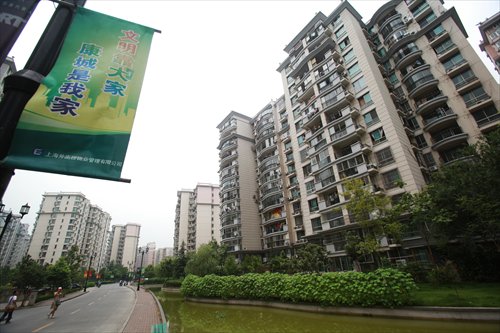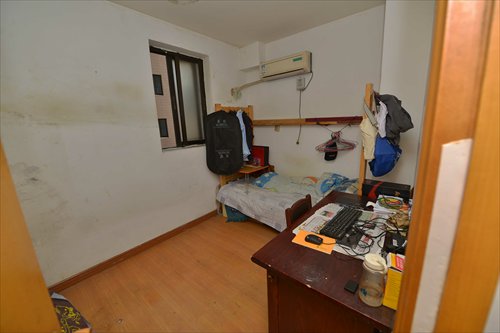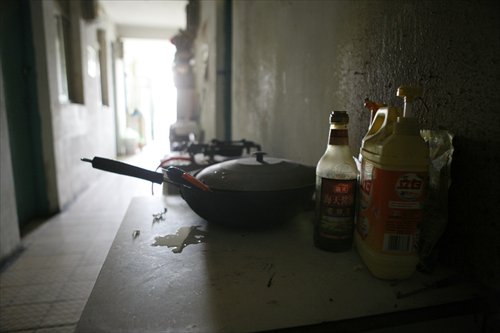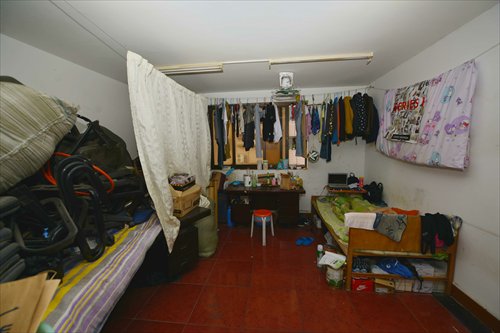HOME >> METRO SHANGHAI
When a house is not a home
Source:Global Times Published: 2015-11-29 17:38:01
Minhang district to crack down on illegal group rent apartments

Minhang district authorities target group rent apartments in this large residential complex. Photo: IC
In Shanghai it's called group renting and it occurs when a landlord or apartment owner illegally turns a comfortable one- or two-bedroom apartment into one that can accommodate up to 10 or more people.
Using plywood walls and dodgy electrical and plumbing fittings, suddenly residential complexes have to cope with five or six times the number of residents. And they bring with them extra problems often with parking spaces and noise, as well as safety issues because of blocked fire exits and rubbish packed in hallways alongside unauthorized electrical wiring.
In December Minhang district authorities will crack down on group renting in one of the city's largest residential complexes - Shanghai Kangcheng. Located in Xinzhuang town of Minhang district, Shanghai Kangcheng is a popular place for workers because is has good public transport links, good shopping centers and plenty of food stores and restaurants in the neighborhood.
The complex was first developed in the late 1990s and it is now home to 12,500 households. Covering 2.08 square kilometers, it has a population of 45,000, including 20,000 Shanghainese residents and 25,000 out-of-towners. But 1,601 apartments here have been adapted for group renting - more than 10 percent of the available homes.

Only the most basic facilities are available in these apartments. Photo: CFP
A challenge
When the demolishing teams move in they will bring sighs of relief from the many inhabitants who had paid to buy or rent homes there not realizing their home life was going to be turned into a chaotic, dirty and disordered challenge. Although Shanghai's house prices have surged, this residential compound has never attracted investors or more affluent buyers because of its reputation as a group rent apartment hub.
Most of the group rent apartments are run by people who have rented the original apartments from owners and then "renovated" the homes, adding walls and rooms that shouldn't be there. Usually the rooms, separated by plywood dividers, have only basic facilities - a bed, a table and a cupboard. The tenants share the bathroom and kitchen.
A reporter from thepaper.cn found one 6-square-meter room in a 6-room apartment which was rented for 600 yuan ($93.86) a month.
Kangcheng's property manager, Mr Luo, told thepaper.cn that he had once discovered a 130-square-meter apartment divided into eight rooms with each being rented for between 700 and 800 yuan. The landlord paid the owner 2,500 yuan a month but collected about the same amount for himself.
"Group renting can be very dangerous. One lot of tenants did their own electrical fittings which caused a fire. There has been fighting among tenants and once we found a gang of criminals was renting one of the apartments," Luo said.
He said the property management office received at least 10 complaints involving group renting every day. These "landlords" always renovated in the cheapest possible way, left rubbish in hallways and damaged green areas.
A neighborhood committee official, Weng Peifen, said in one case the landlord had moved a bathroom in an apartment to the balcony area but the plumbing was badly connected and water poured into a neighboring apartment causing major damage.
Mr Guo who lived on the ground floor used to air his quilts in his courtyard but discovered someone was smoking in the rooms above and throwing their cigarette butts onto his quilts. Nowadays he airs his clothes in his balcony.

Tenants share the often shabby kitchens and bathrooms. Photo: CFP
Heading the crackdown
Zhang Junping is one of the officials heading the crackdown and he told reporters that Shanghai Kangcheng was not a problem when its first residents moved in in 2001 and 2004. But when the compound was developed and sold in 2006 and 2008, real estate investors from Zhejiang Province bought several apartments and asked agents to handle the renting.
Since then middlemen landlords have been leasing these apartments and operating half of the group rent apartments. Weng Peifen said many of these middlemen landlords each operated more than 10 apartments. Because two other management companies had been involved in the compound's daily management in the past records were incomplete and it was hard to find or locate the actual owners, Weng said.
Often the real owners had no idea what was happening in their apartments. One man, surnamed Lu, bought a 130-square-meter apartment in the compound and contracted an agent to rent it out. The agent made it clear in the contract that Lu should not have any contact with the tenant or even visit the property at all. Over the next four years, Lu worked in Hong Kong and never visited the area but in August, his younger brother discovered Lu's apartment had been divided into six rooms and more than 10 people were living there. It took Lu more than a fortnight to negotiate with the middlemen landlord responsible and have the tenants removed.
Although authorities and management companies have been trying to crack down on group renting since 2009, there has been little progress. "Sometimes we found tenants in group rent apartments that had been evicted in the morning but just moved back in the afternoon. After we checked the buildings the landlords just put up the plywood walls again," Zhang said.
The complex employs more than 270 security guards and cleaners but complaints about group rent apartments flood in daily.
In November, the authorities and property management staff have been checking on group rent apartments and apartments being used illegally for business activities and in December 250 group rent apartments will be targeted and more than 70 illegally built security doors and other blockages in fire passages will be torn down.
In 2016 authorities and the compound management want to restore the complex's original environment, cracking down on the remaining 1,351 group rent households before the end of June, demolishing 389-square-meter of illegal structures in the compound's school, shutting down 221 unlicensed businesses and removing 73 illegal security doors and other blockages in fire passages.
To ensure the crackdown runs smoothly the authorities are forming a team of government housing management staff and greenery and environment staff and chengguan (city management officers) who will work with volunteers.
Officials are also considering employing a professional agency to handle all the rental properties here.

A room in a typical group rent apartment Photo: CFP
New regulations
Shanghai introduced new regulations about property rentals last year including suggesting the steps that should be taken to handle group renting. The regulations put the onus on landlords and estate owners to stop group renting and to remove illegal plywood walls whenever they have been discovered by the authorities.
But Zhang Junping said usually landlords won't do this and the authorities have to go into the apartments and remove the illegal structures themselves. The regulations also stipulated that landlords who continued to group rent properties could face fines of up to 100,000 yuan and their apartments would be listed and could not be sold or traded until the structures were removed.
But Xinzhuang town authorities said they found it difficult to contact landlords or that the landlords ignored their instructions. It takes at least six months for a court to issue a legally binding enforcement order.
Compiled by the Global Times based on a report in thepaper.cn
Posted in: Metro Shanghai, City Panorama